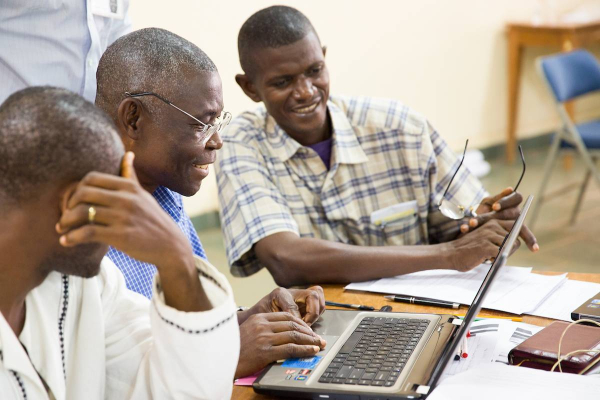What Your Missionaries Mean When They Say …

Your missionaries probably send out a newsletter email regularly to give you updates on their work and lives. Because there’s so much to communicate (and sometimes the details are too personal to send to a large mailing list), you may have seen phrases like the ones below. If you’ve ever wondered what the “rest of the story” behind phrases like these could be, here are a few possibilities!
What they say: “We’ve had some health issues.”
What they mean: “Our stomachs are constantly just a little off and we’re used to that now. But it might be a little gross to talk about all the illnesses we’ve had in the past six months: malaria, typhoid, chikungunya and amoebas. Also, our whole family just finished our second routine round of deworming of the year just in case. Before we became missionaries, we thought deworming was only for pets!”
With different foods, questionable water quality, disease-carrying mosquitoes and new germs they’ve never been exposed to before, it sometimes takes a missionary a while to figure out their new normal.
What you can do: Pray regularly for your missionary’s health, protection and wisdom for them about when they should seek medical care.
What they say: “Thank you for praying for us!”
What they mean: “We know you’re praying for us and that God hears your prayers because if you weren’t praying for us, we absolutely couldn’t do this. Thank you! And please keep praying.”
Your missionary is surrounded by spiritual warfare, especially when they are striving to spread the gospel. Many of their normal support systems like their friends, family and their home church are no longer readily available to communicate with, so they truly rely on the power of prayer!
What you can do: Send your missionary short and quick emails asking how you can specifically pray for them. Ask things like: “What is one thing that’s challenging you right now? What’s one way we can pray for the community you’re serving?” And then pray.
What they say: “We will be doing [this thing], Lord willing.”
What they mean: “We are praying, planning and working toward doing something. But we seriously don’t know how it can happen without God’s divine intervention. If he wants it to happen, it will and we’re learning to be okay with that.”
What you can do: Send an encouraging email or text message to follow up on the event or thing your missionary mentioned in their newsletter. Ask if and how you can help.
What they say: “Our kids are struggling with the transition.”
What they mean: “We stepped out in faith and obedience and we know God is good, but our kids are having a really hard time. Everything about their world has changed. People stare at them all the time and try to touch their hair. They can’t understand anything anyone says to them. They’re lonely and sad, and it is very hard to see them suffer.”
What you can do: Send a fun, light-hearted email specifically to the children of your missionary family. Tell them about your pet or something you did last week. You can ask them to write back with something they like about their new home. Ask your missionary if you can talk to the children on Zoom (and if you have kids of your own, involve them in the call too!).
Missionary kids are surrounded by newness so they may feel homesick for some of the things they can’t get overseas. Send a small care package to your missionary family with inexpensive, fun things from their home country: crayons, punch balloons, water balloons and maybe even some snacks. Include a note or picture from your own family.
What they say: “God has been faithful during this difficult season.”
What they mean: “God and God alone has kept us focused on him and moving forward despite the hardships around us. We have struggled physically, mentally, emotionally and spiritually. We have been discouraged, angry and exhausted. But we know that God is with us, and we are clinging to that truth.”
Sometimes the difficulties of ministry seem insurmountable. The deaths of colleagues, cross-cultural conflicts, sicknesses and more often happen simultaneously in the field with little time for a missionary to process their emotions. Your missionary trusts in God but also feels the immense strain of grief, loss and confusion.
What you can do: First, pray. Then follow the prompting of the Holy Spirit to continue praying, or encourage your missionary by offering counsel and comfort. Sometimes a gentle acknowledgement of the difficulty or a reminder that you are praying makes all the difference.
What they say: “We would love to hear from you! How can we pray for you?”
What they mean: “We send out newsletters regularly, but it’s rare that we hear back from anyone. We miss being in close community with you — celebrating with you and praising God when things are going well, and praying for you when hardships come. We know you’re praying for us, and we want to pray for you too!”
What you can do: Commit to reaching out to your missionary once a month via email, Facebook, WhatsApp, Zoom or another way. Let them know what’s happening in your life and how they can pray for you too.
The Big Picture
Even though they can’t communicate everything that happens on the field during their assignment, your missionary’s newsletters are great ways to connect with them on a deeper level. They’ve been called by God to serve in the work of Bible translation, but your partnership and prayers make it possible for them to serve in their roles. You are important to them and are an important part of their ministry!
If you’ve ever wondered what your missionary friends are most grateful for, check out our blog to learn more!






